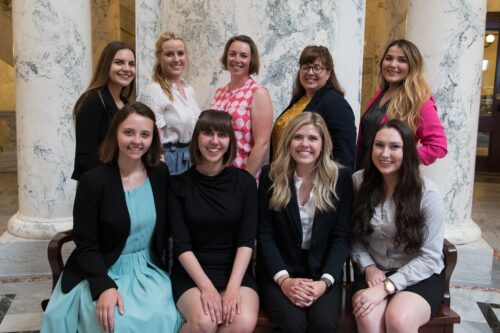
Nearly two dozen undergraduate women representing six Idaho colleges and universities recently spent a week at Boise State attending NEW Leadership Idaho. The annual political “bootcamp” is designed to encourage more women to become leaders in their communities by running for political office.
Boise State’s School of Public Service hosted the program. Students lived on campus where they spent a minimum of 10 hours a day in workshops, then returned to their dorms for independent and group work each evening. Training followed a bipartisan curriculum developed by the Center for American Women in Politics, tailored for Idaho. The local curriculum emphasized leadership through participation in nonprofit organizations as well as city and county politics. For many women, said Lori Hausegger, director of NEW Leadership Idaho, the starting point is local.
Research suggests that while women running for office are as likely as men to be elected, they’re less likely to run in the first place. Women typically question their qualifications and need to be asked multiple times to run before they do so, according to the studies. Men, on the other hand, don’t express that hesitation, regardless of their qualifications.
“We want to make that ‘first ask’ now, and show young Idaho women that they are every bit as qualified as their male peers,” said Hausegger.
Boise State sponsored nine students ranging from sophomores to seniors to participate in the 2018 training. The majority of students who attended were political science majors, though that was not a requirement. Boise State student and trainee Hannah Sturtevant is majoring in human resource management and describes herself as a “political junkie.” She began NEW Leadership already interested in running for office. When asked how NEW Leadership changed her perception of politics, Sturtevant said that she “learned politics can be more collaborative than one would assume.”
This was the fifth year for Idaho’s NEW Leadership program, which began in 2014. The program is already showing results, though a third of this year’s trainees are still in college, said Hausegger.
“One of our students was recently hired as senate minority chief of staff. Another is working as a program specialist in a nonprofit. A young woman still attending Boise State is the campaign manager for District 18, and just last week, one of our former students was in Washington D.C. where a team she was on won a national campaign to ‘Innovate Against Hate.’”
On the first day of the 2018 training session, organizers asked students to rank the likelihood that they would run for office on a scale of 1 to 10, with 10 being the most likely. Students answered the same question the last night of the workshop. The number of students who rated themselves between 7 and 10 doubled over the course of a single week. Other students said that training had inspired an interest in lobbying for a cause, or running a political campaign.
Collaboration and civility were themes throughout the week, both in workshops and in organizers’ choice of guest speakers. Speakers included Idaho State Representatives Ilana Rubel, a democrat, and Christy Perry, a republican, both of whom have taken part in NEW Leadership Idaho since the local program began. Perry and Rubel made a joint appeal for support at NEW Leadership’s mentoring reception. Over the years, NEW Leadership Idaho has attracted an equal number of republican and democrat legislators as participants.